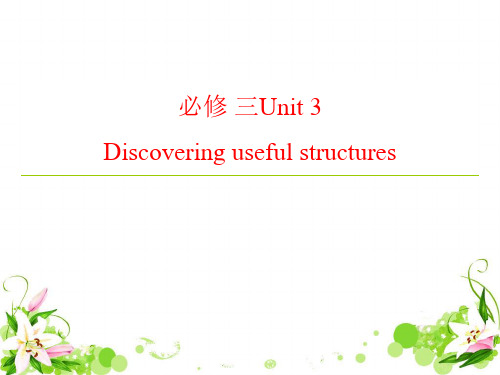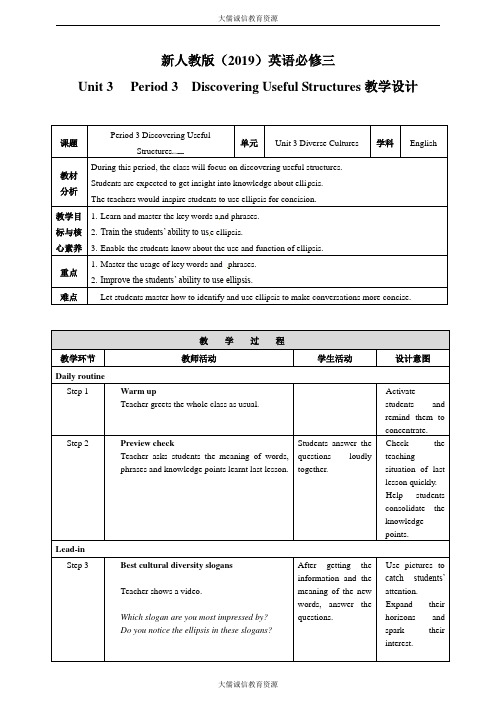新人教英语必修三UNIT 3 Discovering Useful Structure 教学设计
- 格式:docx
- 大小:84.40 KB
- 文档页数:5




Unit3 Discovering Useful Structures 名师教学设计课时内容Understand the use of ellipsis in English主题语境:人与社会主题群:社会服务与人际沟通子主题:跨文化沟通、包容与合作语篇类型:文本、练习文本分析:[What]本课时围绕主题语境设计了三个活动:第一部分是识别英语省略现象;第二部分使用省略改写句子;第三部分呈现外国女孩Justin要到贵州旅游,向玲玲打听贵州的文化景点的对话,要求学生找到对话中省略了的单词。
[Why] 在本单元主题语境中学习英语省略现象。
[How] 本课采用例句示范、改写句子、对话应用的形式,理解英语省略现象,在语法学习的过程中加深对主题意义的理解。
课时目标1.通过描述人们的活动,在语境中学习现在分词作状语和宾语补足语的用法。
2.获取更多关于本单元主题语境的信息,加深对主题意义的理解。
重点难点重点:对英语省略具体用法的理解。
难点:使用省略讨论美国美食和贵州文化旅游景点。
教学准备教师准备:英语省略的练习题。
学生准备:预习英语省略的用法。
教学过程Step I 学习理解活动一:识别省略现象(Part1,P30)1.Ask students to read the following sentences and find the words that have been omitted to avoid repetition.(1)A:Oh,I just love nachos!Mexican corn chips covered in cheese!B:Me,too.(2)A:So it’s the food of many different cultures,all in one dish?B:Exactly.(3)A real mix of cultures here!(4)Can’t wait!2.Ask students to work in pairs and discuss the words that have been omitted to avoid repetition.Suggested answers:(1)A:Oh,I just love nachos!They are)Mexican corn Ips covered in cheese!B:(I love nachos),too(2)A:So it’s the food of many different cultures Cand they are)all in one dish?B: Exactly, (it’s the food of many different cultures, and they are all in one fish)(3)(There is) a real mix of cultures here!(4)(I)can’t wait(to go there)!【备注】语法讲解请见第二教案“综合素养分析—重点语法精讲”。


新人教版(2019)英语必修三Unit 3 Period 3 Discovering Useful Structures教学设计课题Period 3 Discovering UsefulStructures[来源:]单元Unit 3 Diverse Cultures 学科English教材分析During this period, the class will focus on discovering useful structures. Students are expected to get insight into knowledge about ellipsis.The teachers would inspire students to use ellipsis for concision.教学目标与核心素养1.Learn and master the key words a nd phrases.2.Train the students’ ability to us e ellipsis.3.Enable the students know about the use and function of ellipsis.重点1.Master the usage of key words and phrases.2.Improve the students’ ability to use ellipsis.难点Let students master how to identify and use ellipsis to make conversations more concise.教学过程教学环节教师活动学生活动设计意图Daily routineStep 1 Warm upTeacher greets the whole class as usual. -Activate students and remind them to concentrate.Step 2 Preview checkTeacher asks students the meaning of words,phrases and knowledge points learnt last lesson. Students answer thequestions loudlytogether.-Check theteachingsituation of lastlesson quickly.-Help studentsconsolidate theknowledgepoints.Lead-inStep 3 Best cultural diversity slogansTeacher shows a video.Which slogan are you most impressed by?Do you notice the ellipsis in these slogans? After getting theinformation and themeaning of the newwords, answer thequestions.-Use pictures tocatch students’attention.-Expand theirhorizons andspark theirinterest.Step 4 New wordsTeacher explains the mea ning of the newwords, and asks students to translate themeaning of the whole sentence.He was the first man to navigate the Atlantic byair.the Atlantic 大西洋the Pacific 太平洋the Arctic 北冰洋the Indian Ocean 印度洋jeans boot mushroom – picturesIs there any hope of getting financial supportfor the project?financial=monetary=fiscalI read the poem in a collection of modernpoetry.Her drink had been laced with a deadly poison.poisoned poisoning poisons poisonerI folded the letter (in half) and put it in anenvelope.fold-openThe Natural History Museum is a super placefor kids.super-excellent -Teach the meaning of new words.Step 5 L et’s playTeacher choses students to answer thequestions.1.He navigated the ship across the _________Ocean.2.The company needs more _________assistance from the government.3.She's published two books of lyric _________and a novel.4.Bottles of lemonade doctored with rat_________ were discovered in the kitchen.5.Just _________ this piece of paper back, so,and make a crease here. -Familiarize the new words-Clear the tackle of next step.6."Did you enjoy the film?" "Yes, I thought itwas _________."keys:1. Atlantic 2. financial 3. poetry 4. poison5. fold6. superUseful StructuresStep 6 Let’s learnTeacher shows the questions and asks studentsto answer.Read the following sentences and find thewords that have been omitted to avoidrepetition.1A: Oh, I just love nachos! Mexican corn chipscovered in cheese!B: Me, too,2 A: So, it’s the food of many differentcultures, all in one dish?B: Exactly.3 A real mix of cultures here!4 Can't wait!Rewrite the sentences by taking out theunnecessary parts.1.You mean you are planning a trip across theAtlantic for a holiday? It sounds like a goodidea.2.He tried to solve his financial problems, buthe couldn’t solve the problems.3.If it is necessary, I’ll finish my report onAmerican poetry as soon as it is possible.4.Are you going to dress like that? Wearing adress might be better than wearing jeans andboots.5.Some wild mushrooms are poisonous andsome are not poisonous.6.I really like that paper folding book, and myson likes that paper folding book, too.Keys:1.You mean you are planning a trip acrossthe Atlantic for a holiday? Good idea.2.He tried to solve his financial problems,but couldn’t.3.If necessary. I’ll finish my report onAmerican poetry as soon as possible.4.Are you going to dress like that? A dressmight be better than jeans and boots. Do the practice andexpress the reasons.-Familiarizestudents withkey structures.-Exercisestudents’structures usingskills.5.Some wild mushrooms arc poisonous andsome are not.6.I really like that paper folding book, andmy son, too.Read the conversation. Find out which words have been left out.Justin: Linlin, I'm going to Guizhou Province next month. I'm super excited! Any recommendations for places to visit? Linlin: Wow, cool! Guizhou is a province with a lot of cultural diversity. Places to visit... well, definitely the Huangguoshu Waterfall first.Justin: What's special about the waterfall? Linlin: Well, have you ever heard of the Chinese novel Journey to the West?Justin: Yes, I have. Why?Linlin: In the back of the waterfall, you wil find a cave, which is the home of the Monkey King.Justin: Really? Cool! I'll definitely check it out.Linlin: And I strongly recommend the ethnic minority villages. You'll find Chinese culture is much more diverse than you thought. Justin: Sounds great, thanks!Keys:Justin: Linlin, I'm going to GuizhouProvince next month. I'm super excited!Any recommendations for places to visit?Linlin: Wow, that’s cool! Guizhou is aprovince with a lot of cultural diversity.Places to visit... well, definitely theHuangguoshu Waterfall first.Justin: What's special about thewaterfall?Linlin: Well, have you ever heard of theChinese novel Journey to the W est?Justin: Yes, I have. Why?[来源:学科网]Linlin: In the back of the waterfall, youwil find a cave, which is the home of theMonkey King.Justin: Really? Cool! I'll definitely checkit out.Linlin: And I strongly recommend theethnic minority villages. You'll findChinese culture is much more diverse than you thought.Just in: Sounds great, thanks!Step 7 Ellipsis主语(I) Beg your pardon.(You) Sit down, please.[来源学科网ZXXK](It) Sounds like a good idea.谓语或谓语的一部分(Is there) Anything I can do for you?(Is) Anybody here?宾语A: Where has Mr. Smith gone?B: Sorry, I don’t know (where he has gone).主语和谓语,或主语和谓语的一部分(Are you) Hungry?(I want) Orange juice, please.(Do you) Understand?不定式to后省略动词A: Would you like to come to the party?B: I’d love to (come to the par ty).You don’t have to tell me if you don’t want to(tell me).宾语A: Where has Mr. Smith gone?B: Sorry, I don’t know (where he has gone).并列句She went to the clinic and (she) saw a doctor.Sally will be arriving today and Ann (will bearriving) tomorrow.表示比较的从句She looks older than my mother (does).对话(It) Sounds fine to me.(I’m) Sorry I couldn’t come.(Pass me) The salt, please.告示、标牌、报纸标题Students learn theuseful structures.-Get th e usefulstructures.the________of the urban youth tends to reveal their anxiety over a lack of sense of belonging.A.perspective B.priorityC.participationkeys: A句意:从都市青年的角度写的诗歌倾向于反映他们对缺乏归属感的焦虑。
Unit 3 Discovering Useful Structures 学案【本课目标】1.通过阅读课文,在具体情境中理解和掌握省略的用法。
2.通过本学案的归纳,巩固内化省略的用法,并学以致用。
【自主学习】【语法图解】【探究概况】1.Though tired, they went on working.2.Doesn't matter.3.(课本P28)This district used to be a poor area of town, but is now a centre for art, music, and food.4.(课本P28)A real mix of cultures here!5.Hope to hear from you soon.【自我归纳】上述句子中,1为的省略;2,3,5为省略;4为的省略。
为了避免重复,将句子中的一个或几个成分省去,这种语法现象叫省略。
省略是避免重复、突出新信息并使上下文紧密连接的一种语法手段。
英语中的省略有下列几种情况。
【语法详解】在英语中,为了使句子简洁明快突出重点,常常省略句中的一个或几个成分,只要不影响句意表达,某些情况下,能省略的成分尽可能省略。
一、词法的省略1.动词不定式的省略①He didn't come, but he ought to have (come).他没来,但他本应该来。
②His wish is to earn a lot of money and (to) buy his mother a big house.他的愿望是赚很多钱给妈妈买所大房子。
2.介词的省略I have some trouble (in) learning English.我学英语有些困难。
3.替代性省略①—Can I put my bike here?—You'd better not.—“我可以把我的自行车放在这儿吗?”—“你最好不要。
Unit 3 The InternetPeriod 3 Discovering Useful StructureThe Present Perfect Passive Voice教学设计This unit is about the Internet, which has a great influence to our humans and our lives. During the Listening & Speaking & Talking and Reading and Thinking section, the influence in examples has been shown. Thus, use the Present Perfect Tense is appropriate. However, in order to show the justice or weaken the doer of the behavior/action, it’s better to use the Present Perfect Passive V oice than the Present Perfect Tense. Besides, having learned to use the Present Perfect Passive V oice, students can beautify their language in their writing.1.Learn the structure of the Present Perfect Passive V oice and its functions.2.Learn to change the sentences with the Present Perfect Passive V oice into the sentences with the Present Perfect Passive V oice.3.Learn to write sentences with the Present Perfect Passive Voice flexibly according to the context.1.Learn the structure of the Present Perfect Passive V oice and its functions.2.Learn to change the sentences with the Present Perfect Passive V oice into the sentences with the Present Perfect Passive V oice.3.Learn to write sentences with the Present Perfect Passive Voice flexibly according to the context.Step 1 Observe the following sentences, then change the sentences into passive voice.1.The Internet has greatly improved Jan’s life.Jan’s life has been greatly improved by the Internet.(教材P28)Step2 Summarize the structureFrom above the pictures, we can know that the structure :Other structures:肯定结构 have/has +been done Much has been written (by People) about the wonders of the World Wide Web.(教材P28) 2.People have written much about the wonders of the World Wide Web. A kind of new PC has been built (by them) with more functions. 3.They have built a kind of new PC with more functions. The software has been downloaded (by me) to help my phone last longer. 4.I have downloaded the software to help my phone last longer. Verb form Passive Active have/has+been+v -ed have/has+v -edHe has been selected to take part in the sports meeting.(肯定句)他已被挑选出来参加运动会。
The ink has not been removed from his overcoat.(否定句)墨迹还没有从他外套上去掉。
Has the date for the next meeting been decided?(一般疑问句)下次会议的日期已确定了吗?How long has the battery not been changed?(特殊疑问句)电池多久没有更换了?Step 3 The usage or functions1.表示过去发生的动作对现在产生的影响和结果,且这个动作与句子的主语有逻辑上的动宾关系。
I have been told the sports meet will be put off.我已被告知运动会将要被推迟。
(结果:现在我已经知道运动会要被推迟)All the preparations for the task have been done,and we're ready to start.这项任务的一切准备都已就绪,我们准备好要开始了。
(影响:我们现已具备开始的条件)2.表示一个被动的动作或状态从过去开始,持续到现在,并且有可能继续持续下去。
常与for +时间段或since+时间点等时间状语连用,此时,该被动语态的动词应使用延续性动词。
The machine has been repaired for two hours.这台机器已被修了两小时了。
(持续:两小时前开始修,现在可能已经修好,也可能没有修好,还要继续修)She hasn't been heard from since then.从那时候起,她就没来过信。
(持续:从那以后,一直没收到她的信,以后也可能收不到)3.在状语从句中,常用现在完成时的被动语态代替将来时的被动语态。
I will go home when my homework has been finished.当我完成家庭作业时我就回家。
(将来某时处于被完成的状态)Step 4 Special cases1.现在完成时的被动语态中has/have been不可漏掉。
The plan has been studied by the experts for three times.这个计划已经由专家研究三次了。
The dirty clothes have been washed.脏衣服已经被洗好了。
2.现在完成时的被动语态强调过去发生的事与现在有联系;而一般过去时的被动语态所表示的动作只与过去有关,与现在没有关系。
The library has been built.这座图书馆已经建好了。
(图书馆可以用了)The library was built last year.这座图书馆是去年建成的。
(图书馆现在是否能用是未知的)3.含有非延续性动词,如begin,start,buy,borrow,finish等的现在完成时的被动语态的肯定式不能与表示一段时间的状语连用。
这些动词的现在完成时的被动语态的否定式则可以与for或since 构成的时间状语连用。
The work has been finished for two days.(×)This book has not been borrowed since last week.(√)4.动词短语用于现在完成时的被动语态时,动词后面的副词或介词不可漏掉或省略。
The injured bird has been looked after since it was saved.(after不可漏掉)受伤的小鸟被救后一直被照看着。
4.并不是所有的动词都有被动语态。
如happen, occur, take place, break out, belong to, cost, last等不及物动词或词组, 就没有被动语态。
试比较:Some of the best conversations have ever been happened around the dinner table. (X)Some of the best conversations have ever happened around the dinner table. (√)Step 5 Practice1.他的小说还没有出版。
His novel ________________________.(publish)2.所有的信都已经寄出去了吗?________ all the letters ______________?(post)3.他的工作尚未完成。
His work ______________________.4.新的订票制度已在使用中了吗?________ the new booking systems for tickets ____________?5.They have built many houses in the village in the past few years.→Many houses ________ ________ ________ in the village in the past few years.6.We have planted many trees on the hill in the past 5 years.→Many trees ________ ________ ________ on the hill in the past 5 years.7.His sister left home in 1998,and ________ since.(hear)8.工作一完成我们就立即动身。